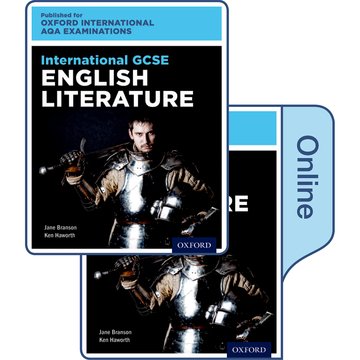OxfordAQA International GCSE English Literature (9275): Print & Online Textbook Pack
The only textbook for OxfordAQA International GCSE English Literature
Author Ken Haworth and Author Jane Branson
Suitable for: 14-16 year old students of OxfordAQA International GCSE English Literature (9275)
Price: £36.99
+VAT
ISBN:
978-0-19-841192-5
Publication date:
27/10/2016
Pack:
256 pages
Availability: In stock.

Digital Evaluation
Schools can access an online copy of the whole book free of charge for 30 days. At the end of the evaluation period, you can buy printed copies here or through your usual sales consultant or bookseller.
Free Trial
Register your school for a free trial of the digital subscription. For more information contact your local educational consultant.
You can use the basket to:
- pay by credit card
- order on account
- forward to a colleague
Description
Features
- Strengthen students' reading, writing and reasoning skills with extensive opportunities for critical thinking, evaluation and analysis.
- Embed confidence for both the Unseen and specification set texts with extracts and exercises drawn from a wide range of prose and poetry.
- Encourage students to develop critical and independent responses to literature, preparing them for A Level study.
- Support every student with Stretch and Support exercises that provide additional help or further challenge where necessary.
- Challenge and motivate your students with carefully selected texts, designed to suit the international classroom.
- Support students' understanding of challenging language within example texts and the terminology needed for critical analysis with Tips, Key Terms and a comprehensive glossary.
- This pack includes one print textbook and one online textbook.
- The online textbook can be accessed on a wide range of devices and the licence is valid until 31st December 2026, for use by one student or teacher. Your first login will be sent to you in the mail on a printed access card.
This page was last updated on 22 December 2024 at 20:30 GMT
Table of Contents
Becoming a literature student
1: The benefits of reading literature
2: Understanding the assessment objectives
3: Practising engagement and analysis
Part 1 Developing your literature skills
Themes, ideas and contexts
1: Introduction to AO1
2: Exploring theme
3: Developing ideas in texts
4: Looking at context
5: More about context
6: Steps to success
7: Writing about texts
8: AO1: what examiners look for
9: Putting it all together
The writer's craft
1: What is characterisation?
2: Analysing characters
3: How writers use plot
4: Understanding form
5: Understanding structure
6: How writers use language
7: Understanding literary techniques
8: Literary techniques and meaning
9: Stage directions
Responding to literary texts
1: Giving an informed, personal response
2: Using specialist terms
3: Writing coherently and accurately
4: Planning and writing a response
5: Organising answers and using evidence
6: Looking at question structure
7: Reviewing AO3
Part 2 Applying your literature skills
Responding to prose and drama
1: Reading and collecting evidence
2: Writing about character
3: Writing about relationships
4: Revising themes and ideas
5: Understanding questions
6: Looking at Shakespeare texts
7: Using references and quotations
8: Linking, comparing and contrasting
9: Writing about structure
Responding to unseen prose
1: Skimming, scanning and planning
2: Reading in detail
3: Exploring word choices
4: Looking at setting
The Poetry Anthology
1: Introduction to 'People and Places'
2: Meaning and context
3: Language: 1
4: Language: 2
5: Creating images: 1
6: Creating images: 2
7: Form and structure
8: Links and connections
9: Writing about the Anthology poems
10: Writing about your own choice of poem
Responding to unseen poetry1: Introduction to unseen poetry
2: Making meaning
3: Looking at language
4: Form and structure
5: Unseen poetry - planning an answer
6: Unseen poetry - coherent, high-quality writing
7: Preparing for the exam
Part 3 Look how far you've come!
1: Reading and responding
2: Reviewing and practising
Glossary
© 2024 Oxford University Press. All rights reserved.








